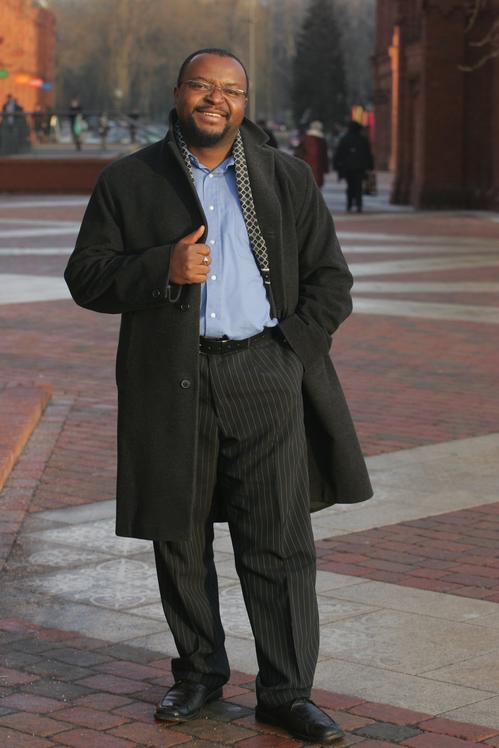An Igbo from Łódź
A conversation with John Godson, Poland’s first black member of parliament.
FILIP MAZURCZAK: Are the Poles a tolerant nation?
JOHN GODSON: I believe that the Poles are very tolerant. Situations of racism are marginal. In Poland we have what is called low intercultural competences, which is not the same thing as racism. Racism is when people who are informed and have contact with other cultures believe that their culture and their race is superior. But what we have in Poland results more from a lack of knowledge and the fact that post-Second World War Poland is a very homogeneous society. Communism made it difficult for Poles to travel abroad. But since Poland is in the European Union and the Schengen Zone, this is changing. We see that very slowly the intercultural competences of Poles are increasing.
November 19, 2013 -
Filip Mazurczak
-
Interviews

John-Godson-portret.jpg
You have been a Polish citizen since 2001, and you are very active in helping to change Poland. Do the Poles consider you to be a Pole?
Naturally, most people see me as a Pole. Certainly, there are some people who consider me to be a foreigner, but this is understandable. In Europe, the autochthones have a strong feeling of national identity, unlike in America or Canada where almost everyone is an immigrant or descended from immigrants. However, I consider myself to be a Pole of African background.
Nigeria, your country of birth, could become a big player in the global economy in the next century due to its large oil reserves. Could Nigeria could become a strategic energy partner of this part of Europe?
Of course! In general, I would like to speak of Africa more broadly, not only of Nigeria. Africa is the continent of the future. Currently, six of the ten fastest growing economies in the world are in Africa. Up until now, unfortunately, Europe has not had a partner-based approach to its relations with Africa, always instead having a paternalistic perspective, resulting from a historical legacy of colonialism. Thus, I believe that a new approach is necessary. Africa cannot be treated as nothing more than a continent of problems, of disease and poverty. It is a continent with great potential, and a continent of proud people. I believe that Africa should be treated with respect and not objectified. For me, it is important that Poland will find an ally in Africa.
Do you think that with Poland and Nigeria’s shared experience of colonialism, relations between the two nations could become friendlier and easier than with West Europeans?
Certainly! In certain African countries there is a special sentiment towards other post-colonial states. With regards to Poland, there is a certain feeling of empathy based on similar historical experiences. Poland was colonised by Russia, so this builds a certain shared perspective. And I myself see this. I have visited Nigeria three times this year. Twice on economic missions and once for a conference, and I see that Nigerians are very friendly towards Poles and are very open to cooperation.
Ninety per cent of Poles consider themselves Catholic, whereas you are Protestant. As a Protestant, what are your relations with Polish Catholics like?
I try not to divide people into Catholics and Protestants. I distinguish between believers and non-believers; and to me it is unimportant whether someone is Catholic or Protestant. You can be a Protestant without faith, but also a truly religious Catholic. If someone takes his faith seriously, we have the same God, and will have the same values and the same worldview. So to me someone’s denomination is unimportant.
You were one of the few Łódź city councillors who voted against canonising St. Faustina Kowalska (a 20th-century Polish nun canonised in 2000 – interviewer’s note). Do you think that this initiative resulted from the Church’s excessive power?
I would not like to decide whether the Church has too much power or not. This is Poland; we live in such a country. There are other countries, such as Nigeria, where Catholics are a minority, but here it is different. With regards to the vote on choosing a patron for the city, I decided that Łódź is multicultural city, and its history was created by four cultures, those of Protestants, Catholics, Orthodox and Jews. And I believe that Łódź deserves a patron who is the embodiment of this multicultural legacy. But, unfortunately, the city council decided otherwise.
Dr. John Abraham Godson was born in Nigeria to an Igbo family in 1970. A former Pentecostal minister, he came to Poland as a missionary in 1993. He has been a Polish citizen since 2001. He lives in Łódź with his wife and four children. He holds a doctorate in political science from the University of Warsaw, and has studied in Nigeria, Poland and the United States. Godson has lectured at many prestigious Polish universities. In 2010 he became a member of Poland’s parliament. From 2004 to 2013, he was a member of Poland’s ruling party, Civic Platform, and belonged to the party’s socially conservative, pro-free market wing. He left the party citing ideological differences, and together with member of parliament Jacek Żalek and Poland’s former Minister of Justice Jarosław Gowin is creating a new Polish social movement devoted to promoting free market reforms and defending traditional values.
Filip Mazurczak studied history and Spanish literature at Creighton University and international relations at The George Washington University. He has interned at The United States Congress and The American Enterprise Institute, and his articles have appeared in publications such as First Things, Tygodnik Powszechny, and Katolicki Miesięcznik “LIST”.


































